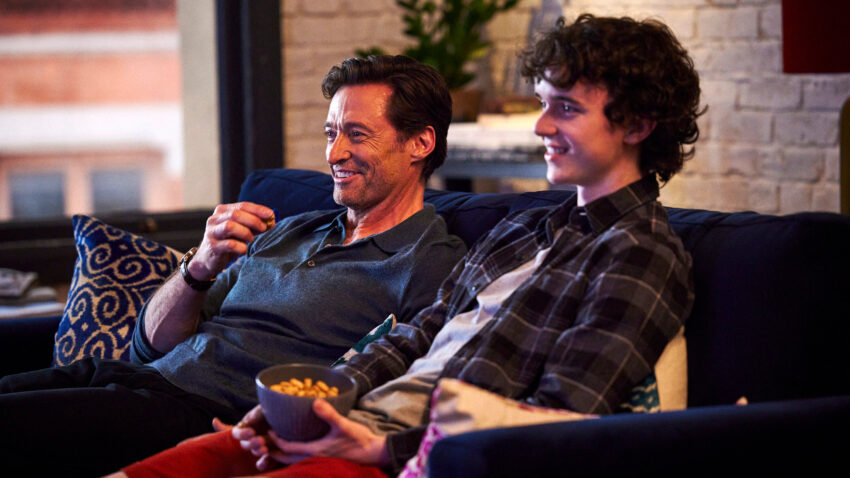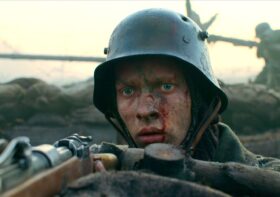The Son: Teenage Depression Takes Center Stage in This Pandering Adaptation

Florian Zeller Fumbles With A Contrived and Lifeless Follow-up To 2020s The Father
Jumping from the stage to the silver screen is no easy feat. As the dimensions change, stories are often extended or warped to fit the margins of a new medium. Some embrace the cinematic tools given at their disposal. Think of John Patrick Shanley’s Doubt or, more recently, Stephen Karam’s The Humans. These are adaptations that relish in a new form of media, proving their story’s versatility and universal appeal. On the other end of the spectrum are adaptations that know their strengths lay from where they originated. They find comfort and success in the restrained confines of a single stage, utilizing it to their advantage with significant effect.
The Son is neither of these.
The film follows Peter and his busy life with his new partner and their newborn baby. Things are only disrupted once Peter’s ex-wife Kate shows up concerned about their teenage son, Nicholas. The boy hasn’t been to school in over a month and is at risk of being expelled. But that’s not all. There’s something else—something off about Nicholas. Something that’s left Kate scared of her own son. After his son’s pleas, Peter brings him to live with him and his new family. What follows is a sloppy, hollow shell of a movie that offers less than it thinks it does.
With a solid concept backed by a talented, stacked cast, the film was poised to be one of the better entries of the year, with some even predicting a return to the Oscars for lead Hugh Jackman and writer/director Florian Zeller (Zeller previously won for penning the adaptation of 2020s The Father, the spiritual sequel to The Son both on film and stage). And while Jackman delivers on these expectations, adding subtleties to his performance as Peter grows increasingly desperate, the film falls behind his excellence, casting broad strokes of melodrama instead of painting a nuanced depiction of mental illness. It’s with this curt approach that The Son fails instantly in where The Father succeeded.
With The Father, Zeller threw us into the mind of our dementia-ridden protagonist entirely, forming the film as more of a puzzle than a linear story. As the story progressed and characters weaved in and out of the narrative (some played by multiple actors), we became just as confused or out-of-touch as our titular father. This was, in part, due to Anthony Hopkins’ heart-breaking performance but also a sentiment to the craft behind the camera. Unfortunately, The Son doesn’t translate any of this success, not even attempting to place us in the mindset of the central son. Instead of creatively immersing us in the world and psyche of these struggling characters, the film was built with a bland aesthetic of repetitive shot, reverse-shot angles roughly stitched together by choppy cuts, and disjointed transitions. Not only does this leave less of an impact on the viewer, it undermines the substance behind the film. While The Father was a twisty insight into the demeaning effects of dementia, The Son failed as a broad attack on teenage mental illness, offering little to no depth as to why our titular son is struggling. This brings us to…
…The son himself. With such a pivotal role, the film rode and existed on the shoulders of Zen Mcgrath. And Mcgrath’s performance is a mixed bag, to say the least. It’s not that the newcomer isn’t talented; he might even have a bright career ahead of him. McGrath holds his own just fine against the likes of Laura Dern and Hugh Jackman but is never able to bring the meaty material to life on his own. While it’s unfair to compare any young actor to someone of such prestige as Anthony Hopkins, I couldn’t help but draw another comparison between this film and The Father. Each film revolved around a central performance that needed to carry the massive weight of the material, and while Hopkins blew it out of the water with his Oscar winning-performance, McGrath suffocates under this pressure, succumbing to the movie’s mediocrity.
Even in all its vapid mundanity, the film assembled a compelling ensemble of dedicated performers, each one doing their best to elevate the stale material given to them. Jackman continues to prove he’s much more than Wolverine or Jean Valjean, while Dern and Kirby offer compelling foils for each other. Even Hopkins reteams with Zeller for a single searing scene. With an ensemble of this magnitude, it’s frustrating to see it wasted on such contrived work.
Ultimately, The Son is a film struggling to find something to say. To make meaning of a subject that’s hard to understand. And while Zeller spoke volumes with The Father, he has trouble finding his voice with this follow-up. I guess lightning doesn’t always strike twice.


Leave a Reply